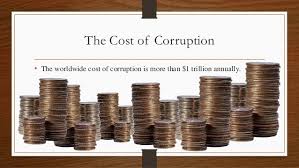The Costs of Corruption
 We always hear about the macroeconomic impact of corruption. Using large figures in the billions and even trillions (5 percent of global GDP) and painting catastrophic pictures of societal harm, anti-corruption advocates paint a terrifying picture of global, regional and specific country harm. These figures are fairly well established between world and regional development banks and provide ample motivation to join the fight against corruption.
We always hear about the macroeconomic impact of corruption. Using large figures in the billions and even trillions (5 percent of global GDP) and painting catastrophic pictures of societal harm, anti-corruption advocates paint a terrifying picture of global, regional and specific country harm. These figures are fairly well established between world and regional development banks and provide ample motivation to join the fight against corruption.
Add to these economic costs the impact that corruption has on every day lives and the picture becomes frightening. Economic harm to a country to the already impoverished has a direct and immediate harm. While corrupt officials and business people line their pockets with money intended for economic development or basic government services and financing, the people in need continue to suffer. This is not an exaggeration when you consider the impact of corruption on emerging or developing economies. Advanced economies continue to suffer from corruption, albeit at a lower rate than developing or emerging economies.
Corruption is a “tax” on businesses as well as social and economic classes. The poor pay the highest percentage of their income to corruption while the wealthy pay a lower percentage.
On a microeconomic scale, you have to consider what the impact on a particular community could be. For example, the scenario of a small community waiting on government funds to build a bridge, develop a water treatment center or other vital infrastructure project, and eventually seeing the project grind to a halt or even fail to occur despite government assurances is all too common. Corrupt government officials who shake down businesses for bribes often have no problem in taking government funds for personal purposes and leaving the community without any benefits or recourse. Unfortunately, this is the situation in many economies worldwide.
Building government institutions ad procedures to prevent or minimize the risk of corruption is a noble and just cause. To the extent that developed countries and supporting institutions can support these efforts, these are dollars that are well spent. In the end, institutions that have transparency built into them, along with appropriate controls to minimize corruption, are an important preventive strategy.
When it comes to fighting corruption, it is hard to understand why the private sector does not devote more effort to the cause. Global businesses suffer real and substantial harms from corruption, and face daunting challenges in emerging economies. Joining forces with NGOs, concerned citizen groups, government anti-corruption agencies, politicians and the judiciary is a no-brainer but for some reason the effort appears to be lackluster at best.
When viewed in the overall context of the global corruption battle, the FCPA and the US enforcement effort is a relatively small but important aspect of the battle against corruption. It is important to prevent business from securing benefits by paying bribes and undermining foreign governments. This battle becomes even more important when you consider the direct link between corruption, destabilization of foreign governments, and creation of terrorist havens in failed government states.
More importantly, however, the battle against corruption requires far more coordination and support beyond law enforcement and prosecutions. The anti-corruption crusade requires political, business and public support in an organized and effective campaign across countries, regions and continents.
The anti-corruption political movement in India is one example of how corruption can become the prime engine behind a political movement. However, the success in India is still years away, if it ever occurs.
 I would be interested in assessing where anti-corruption dollars and resources are best spent. Where is the greatest return for each dollar spent?
I would be interested in assessing where anti-corruption dollars and resources are best spent. Where is the greatest return for each dollar spent?
I can imagine that dollars spent on creating or reforming government institutions to promote transparency and reduce opportunities for corruption would be a very productive effort. Of course, such projects will always depend on the commitment of political leaders to enact such reforms and the sustainability of such reforms.
We have plenty of leaders and armies in the fight against corruption, and of course, more resources would be better. In the end, political will, organization and education are the keys to success. To those who have devoted their talents to this cause, we all admire you for your work and dedication. It is certainly a noble cause.
















2 Responses
[…] Read Full Article: The Costs of Corruption – Corruption, Crime & Compliance […]
[…] Read Full Article: The Costs of Corruption – Corruption, Crime & Compliance […]